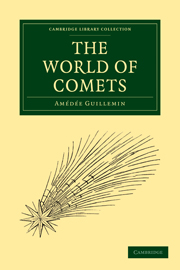Book contents
- Frontmatter
- EDITOR'S PREFACE
- PREFACE
- Contents
- LIST OF ILLUSTRATIONS
- CHAPTER I BELIEFS AND SUPERSTITIONS RELATIVE TO COMETS
- SECTION I COMETS CONSIDERED AS PRESAGES
- SECTION II COMETS IN GREEK AND ROMAN ANTIQUITY
- SECTION III THE COMETS OF THE MIDDLE AGES
- SECTION IV COMETS FROM THE RENAISSANCE TO THE PRESENT DAY
- CHAPTER II COMETARY ASTRONOMY UP TO THE TIME OF NEWTON
- CHAPTER III THE MOTIONS AND ORBITS OF COMETS
- CHAPTER IV PERIODICAL COMETS
- CHAPTER V PERIODICAL COMETS
- CHAPTER VI THE WORLD OF COMETS AND COMETARY SYSTEMS
- CHAPTER VII PHYSICAL AND CHEMICAL CONSTITUTION OF COMETS
- CHAPTER VIII PHYSICAL TRANSFORMATIONS OF COMETS
- CHAPTER IX MASS AND DENSITY OF COMETS
- CHAPTER X THE LIGHT OF COMETS
- CHAPTER XI THEORY OF COMETARY PHENOMENA
- CHAPTER XII COMETS AND SHOOTING STARS
- CHAPTER XIII COMETS AND THE EARTH
- CHAPTER XIV PHYSICAL INFLUENCES OF COMETS
- CHAPTER XV SOME QUESTIONS ABOUT COMETS
- I ELLIPTIC ELEMENTS OF THE RECOGNISED PERIODICAL COMETS OF THE SOLAR SYSTEM
- II GENERAL CATALOGUE OF THE ORBITS OF COMETS
- Plate section
SECTION I - COMETS CONSIDERED AS PRESAGES
Published online by Cambridge University Press: 05 March 2012
- Frontmatter
- EDITOR'S PREFACE
- PREFACE
- Contents
- LIST OF ILLUSTRATIONS
- CHAPTER I BELIEFS AND SUPERSTITIONS RELATIVE TO COMETS
- SECTION I COMETS CONSIDERED AS PRESAGES
- SECTION II COMETS IN GREEK AND ROMAN ANTIQUITY
- SECTION III THE COMETS OF THE MIDDLE AGES
- SECTION IV COMETS FROM THE RENAISSANCE TO THE PRESENT DAY
- CHAPTER II COMETARY ASTRONOMY UP TO THE TIME OF NEWTON
- CHAPTER III THE MOTIONS AND ORBITS OF COMETS
- CHAPTER IV PERIODICAL COMETS
- CHAPTER V PERIODICAL COMETS
- CHAPTER VI THE WORLD OF COMETS AND COMETARY SYSTEMS
- CHAPTER VII PHYSICAL AND CHEMICAL CONSTITUTION OF COMETS
- CHAPTER VIII PHYSICAL TRANSFORMATIONS OF COMETS
- CHAPTER IX MASS AND DENSITY OF COMETS
- CHAPTER X THE LIGHT OF COMETS
- CHAPTER XI THEORY OF COMETARY PHENOMENA
- CHAPTER XII COMETS AND SHOOTING STARS
- CHAPTER XIII COMETS AND THE EARTH
- CHAPTER XIV PHYSICAL INFLUENCES OF COMETS
- CHAPTER XV SOME QUESTIONS ABOUT COMETS
- I ELLIPTIC ELEMENTS OF THE RECOGNISED PERIODICAL COMETS OF THE SOLAR SYSTEM
- II GENERAL CATALOGUE OF THE ORBITS OF COMETS
- Plate section
Summary
Comets have been considered in all times and in all countries as signs, precursors of fatal events –Antiquity and universality of this belief; its probable origin- Opinion of Seneca ; habitual and regular phenomena fail to attract the attention of the multitude; meteors and comets, on the contrary, make a profound impression – The moderns in this respect resemble the ancients contemporary with Seneca –The incorruptible heavens of the ancients, in contradistinction to the sublunary or atmospheric regions; stars and meteors –Inevitable confusion of certain celestial or cosmical phenomena with atmospheric meteors.
In all countries and in all times the apparition of a comet has been onsidered as a presage: a presage fortunate or unfortunate according to the circumstances, the popular state of mind, the prevailing degree of superstition, the imbecility of princes or the calculation of courtiers. Science itself has helped to confirm the formidable and terrible signification most frequently accorded by common belief to the sudden and unexpected arrival of one of these remarkable stars. Not two centuries ago, as we shall shortly see, learned men and astronomers of undoubted merit continued to believe in the influence of comets over human events. What wonder, then, if we should find existing in our own time, in the midst of the nineteenth century, numerous vestiges of a superstition as old as the world?
- Type
- Chapter
- Information
- The World of Comets , pp. 3 - 7Publisher: Cambridge University PressPrint publication year: 2010First published in: 1877



